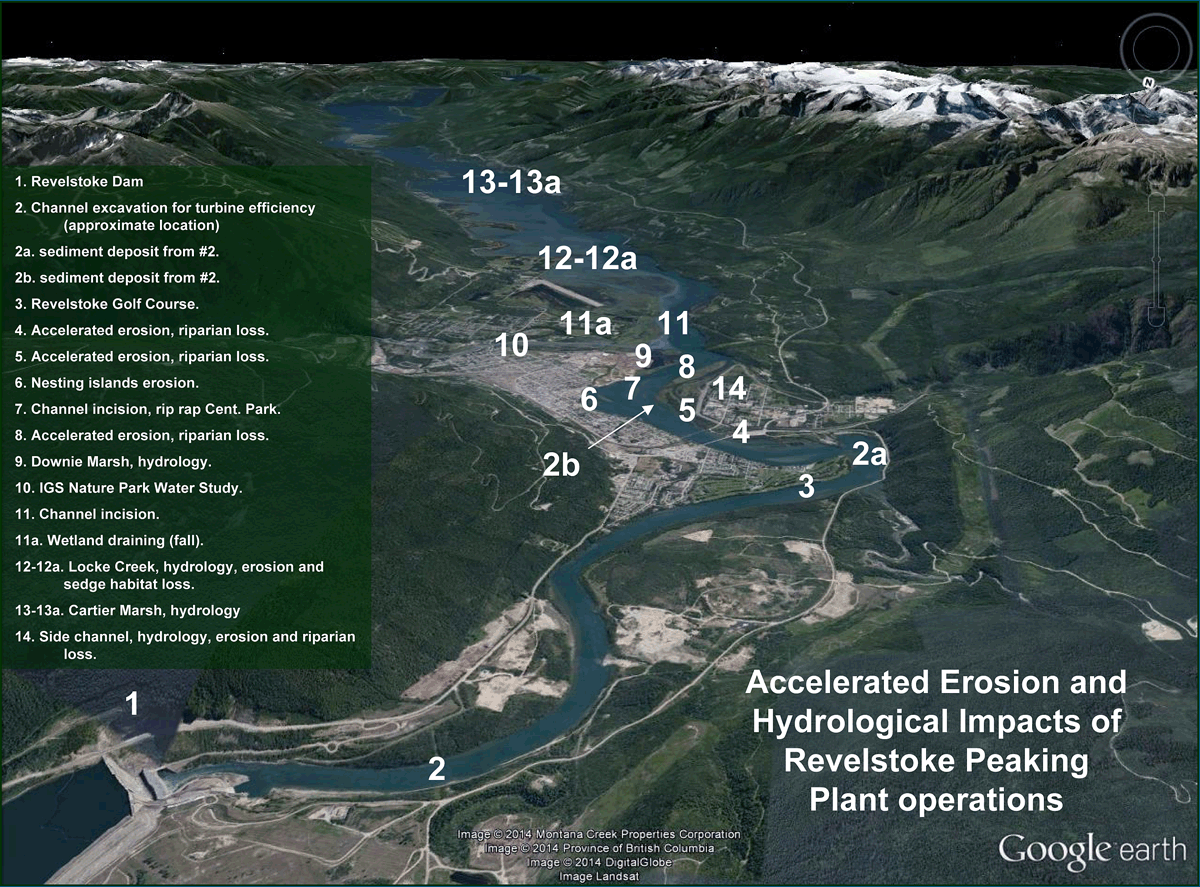
By Francis Lewellyn Maltby
The hydro system on the Columbia River was conceived during the 1940s and 50s. It was about flood control and power generation. No thought was given to the cultural and ecological costs of these developments. Times have changed, these are things we now consider important, worthy of careful thought and ultimately protected from further damages.
The Revelstoke Dam was built 30 years ago with four generating units. Recently, BC Hydro made a good case for the installation of Units 5 and 6 to supply peak demand power. Peak demand occurs when we start our morning breakfast and cook our evening suppers; it is a twice daily spike in energy demand. An Environmental Assessment (E.A.) of the Revelstoke Unit 6 is under way at present. It should consider the history, look at present conditions and think about a healthy future for the Columbia River and its floodplain at Revelstoke.
What are the environmental affects of peak demand? With six units operating at the Revelstoke Dam the river level is the same as during a summer flood. After peak demand periods, the dam reduces the flow of water and the river level can drop to what was a low winter flow. Plants and animals are well adapted to a natural yearly flood cycles occurring over twelve months. However, what was an annual flood cycle is now a daily one. Peak demand creates what are called “pulsed floods,” sudden rapid changes in water levels, up and down. Daily pulsed floods are an unprecedented event for the rivers in our region. River bank erosion, soil loss as well as riparian vegetation losses accelerate; some of our high value wetland habitats will likely experience damaging daily pulsed floods. The river channel is deepening, (“incised” due to channel erosion and lack of replacement sediments which are now trapped behind the dam), with the potential to drain some wetlands and leave some water loving vegetation high and dry during important parts of the year.
What occurs at Revelstoke and the floodplain to our south is quite remarkable. Within BC’s many reservoirs there are very few large areas where a rich and varied ecosystem co-exists within an engineered water control system. After the near total loss of wetlands and riparian habitats between Golden and the US border, a relatively tiny portion of this natural history persists here and in patches elsewhere along the river and Arrow Lakes. Six of the major local wetlands were created by human intervention during the construction of the Arrow reservoir. Two of these built wetlands were in what is now the Illecillewaet Greenbelt Nature Park; one was later filled in with river dredging spoils the other drained by the same dredging project. Airport and Downie Marsh were gravel pits dug out to build a runway and a log yard. Major wetland losses along the Columbia were offset by these tiny and accidental gains. Tiny patches of the original riparian habitat persist around and along the river and reservoir, some of it right inside our community. The Revelstoke Dam operating with the new Units 5 and 6 will put some of these local habitats at risk.
The government of BC and BC Hydro has asked the public to participate in an Environmental Review of the plans for the installation and operation of the sixth unit at the Revelstoke Dam. We must say to the government of BC through the Rev 6 E.A. process that enough is enough. We should not be prepared to loose even more. It is time to protect, create, and restore these now very rare habitats found in our area. The habitat recovery that has happened here since the Columbia River Treaty was signed 30 years ago is proof that this is possible. BC’s power generating rivers also generate over six hundred million dollars in revenue for the provincial budget; some of this money must be invested in measures to protect the environment where the damage has been so great. The Revelstoke Six E.A. and the provincial government must show respect for the river, understand our love of it and support our hopes for its healthy future.
Please click here to read Francis Maltby’s study on this issue.
Francis Lewellyn Maltby is an environmentalist and an active member of the Revelstoke community



